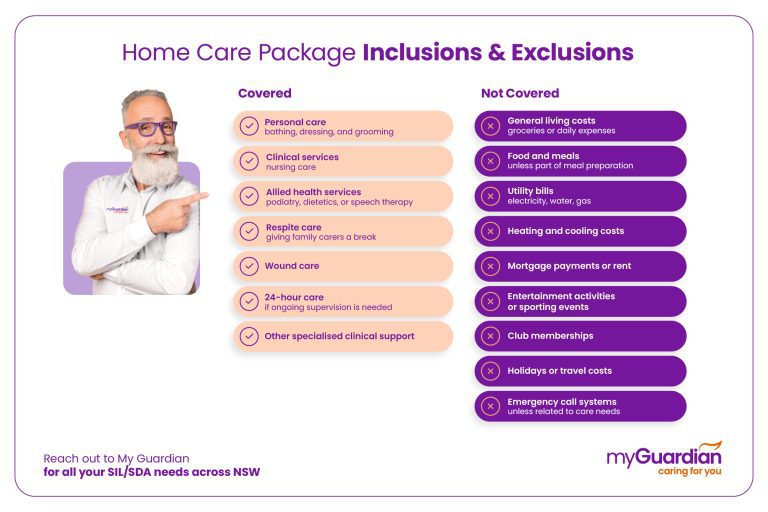Building a smart care plan with home care package providers
Building a smart care plan with home care package providers
Blog Article
Everything About Home Treatment Solutions for Individuals With Disabilities: NDIS Registered Assistance
Home treatment solutions under the NDIS play a crucial function in sustaining individuals with handicaps. These solutions are made to enhance everyday living with customized support, ranging from personal care to flexibility assistance. Understanding exactly how to navigate these options can be complex. This summary checks out the different aspects of NDIS home care, from available services to the option of carriers, highlighting necessary factors to consider for those looking for assistance. The journey toward empowered care starts here.
Comprehending the NDIS and Its Function
The National Impairment Insurance Plan (NDIS) serves as a transformative framework developed to provide assistance and services for people with impairments. Developed to boost the high quality of life and guarantee fair accessibility to crucial sources, the NDIS equips individuals by offering customized plans tailored to their distinct requirements. It intends to foster self-reliance, allowing people to pursue their personal goals and aspirations.Through a structured technique, the NDIS assigns funding for various supports, consisting of education, work help, and neighborhood participation. This all-encompassing plan not only focuses on prompt treatment yet also emphasizes long-lasting developmental end results. By advertising choice and control, the NDIS motivates participants to pick their preferred provider, ensuring that care lines up with their worths and choices. Ultimately, the NDIS represents a considerable commitment to boosting the lives of people with specials needs, promoting inclusivity, and developing an extra supportive society.
Kinds of Home Care Services Available
Different kinds of home treatment solutions deal with individuals with disabilities, primarily concentrating on personal treatment aid and reprieve care alternatives. Personal treatment aid supplies necessary support with daily activities, while respite treatment supplies momentary relief for primary caregivers. Comprehending these solutions is crucial for making sure the health of both individuals with disabilities and their family members.
Personal Treatment Support
While steering day-to-day live can provide obstacles for individuals with impairments, individual treatment support uses crucial assistance customized to their unique demands. This sort of home treatment solution incorporates a variety of tasks designed to promote freedom and boost lifestyle. Individual treatment aides assist with everyday tasks such as showering, dressing, grooming, and toileting, making sure people maintain individual hygiene and comfort. They may also assist with meal prep work, medication management, and wheelchair support. By offering customized care, these experts empower individuals to involve more fully in their social activities and everyday regimens. Generally, individual care aid plays a significant role in cultivating self-respect and autonomy for those with handicaps, permitting them to flourish in their home environment.

Respite Treatment Options
Break care works as an important source for households and caretakers of individuals with disabilities, supplying short-lived remedy for the demands of daily caregiving. This kind of service can take numerous kinds, including at home reprieve care, where trained professionals visit the home to aid with treatment jobs. Alternatively, families might decide for facility-based reprieve care, where individuals receive treatment in a specialized environment, enabling caretakers to take a break. Furthermore, some organizations use emergency break services for unforeseen situations. These options not only assist ease caregiver stress however additionally advertise the well-being of people with handicaps by providing them new experiences and social communication. Generally, break care plays a crucial role in sustaining both caretakers and those they care for.

Just How to Accessibility NDIS Home Care Solutions
Accessing NDIS home care solutions includes comprehending the eligibility standards stated by the National Handicap Insurance Plan. People should navigate a structured application procedure to protect the required support tailored to their demands. This area will make clear both the qualification needs and the steps associated with obtaining services.
Qualification Requirements Clarified
To get NDIS home care solutions, individuals should fulfill details eligibility standards that assess their needs and conditions. Applicants have to be matured between 7 and 65 years and have a significant and irreversible impairment that affects their ability to perform everyday tasks. Additionally, they need to be an Australian citizen, a long-term homeowner, or hold a Protected Special Category Visa. The NDIS requires evidence of the impairment, commonly through medical assessments or records. Individuals need to show that they call for assistance to get involved in economic and social life. These standards guarantee that solutions are routed towards those who truly need support, promoting self-reliance and improved lifestyle for individuals with impairments.
Application Process Steps
Can I Select My Own Support Employees Via NDIS?
The private made inquiries whether they can choose their own support workers under the NDIS framework. Usually, participants have the versatility to select assistance workers, cultivating individualized treatment that straightens with their specific needs and preferences.
What Occurs if My Needs Change After Getting Support?
If a person's demands adjustment after obtaining support, they must interact these modifications to their provider. Modifications can be made to the care plan, making sure that the support continues to be relevant and reliable for their situations.

Exist Limits on The Amount Of Hours of Care I Can Get?
The private asked about potential limitations on the variety of care hours got. Typically, such limitations might exist based on specific policies or funding setups, emphasizing the significance of reviewing arrangements and standards frequently.
Can I Utilize NDIS Funding for Home Alterations?
The question of using financing for home alterations occurs often. Generally, individuals may make use of NDIS financing for needed modifications to their homes, making sure accessibility and safety and security, contingent upon conference details eligibility requirements and standards.
Just how Do I Deal with Complaints About My Home Treatment Solutions?
To attend to grievances concerning home care services, individuals need to first record their concerns. They can communicate directly with their solution company, looking for resolution, or intensify the concern to appropriate oversight bodies if necessary. Home care solutions under the NDIS play a pivotal duty in supporting individuals with specials needs. Numerous kinds of home care services cater to individuals with disabilities, mainly focusing on personal treatment support and respite care choices. support at home. Personal care help gives important assistance with daily activities, while respite treatment supplies temporary relief for key caregivers. Families may opt for facility-based reprieve treatment, where individuals receive care in a specific atmosphere, enabling caretakers to take a break. Exactly how can family members efficiently take care of the financial facets of home care services for people with handicaps?
Report this page